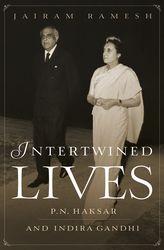History usually remembers only the leaders. Jairam Ramesh’s Intertwined Lives: P.N. Haskar and Indira Gandhi brings alive the lives and times of a man who spent his life being invisible.
Haksar was Indira Gandhi’s principal secretary. But, as Ramesh’s biography illustrates, he had a great deal of influence on India and Indira. He drafted her speeches, helped in appointments, wrote lengthy notes and steered the course of Indian foreign policy.
Haskar spoke his mind. And, Indira listened. She might have been inclined to restart engagement with China earlier. Mao had indicated that he was ready to end the quarrel. Haskar, however, had different ideas.
The book chronicles the remarkable life of Haksar from being on the watchlist of the British agencies to helping create India’s own spy agency, R&AW, with his Kashmiri commrade R.N. Kao. He was witness to all history, helping shape it from his position of being the voice in some ways of Indira.
This extract gives the reader a glimpse of the extent of his power.
EXCERPTS
On 1 May 1970, the prime minister received a cable from India’s charge d’ affaires in China, Brajesh Mishra, who was to occupy Haksar’s position when Atal Bihari Vajpayee was prime minister during 1998–2004. The cable which had been copied to the foreign minister as well read:
At this evening’s May Day celebrations all Heads of Missions were invited to sit at the Tie An Men rostrum to watch the fire-works. MAO arrived late at 9pm...
MAO said to me: “We cannot keep on quarrelling like this. We should try and be friends again. India is a great country. Indian people are good people. We will be friends again some day”. I replied: “We are ready to do it today”. Then MAO said: “Please convey my message of best wishes and greetings to your President and your Prime Minister”. I assured him that it most certainly be done and then congratulated him on China’s success in launching an earth satellite.
*
After a discussion in New Delhi in which Haksar’s views prevailed, Mishra was sent a message from the foreign minister on 6 May 1970, the text of which was PNH’s.
Your telegram… of May 1. We do not wish to under-estimate the significance of MAO’s words. However, we have to assess the significance of the relations between our two countries in the immediate future. Further probing will have to be done. Opportunity for this may present itself when you call on the Director of the Asia Department on May 8.
*
The event described in Mishra’s dispatch of 1 May 1970 has become part of diplomatic history and has come to be known as ‘Mao’s Smile’. In an oral history interview published in 2000, Mishra suggested that India did not take full advantage of Mao’s gesture and should have followed it up immediately. Mishra always believed that while Indira Gandhi was willing, Haksar was amongst the few who prevented her from reciprocating Mao’s gesture and creating a new opening with China. The evidence available shows that Haksar was extremely worried by China’s continuing support to rebels fighting the Indian state in the Northeast region. He was also peeved with the barrage of invective against India in the Chinese media which obviously had official sanction.
*
There is a sequel to this exchange between Haksar and Mishra of May 1970. Indira Gandhi was to send down a note to Haksar on 6 November 1972 in which she asked:
There is a telegram from Mishra in Peking (CCB No. 13231 dated 31.10.72). While we should not get over-enthusiastic perhaps the time has come for us to take some initiative. What should this be? Haksar’s immediate response to this query from the prime minister is not available but many years later on 3 April 1992, he was to write to J.N. Dixit.
*
Full diplomatic relations between India and China were to be restored in May 1976 after a gap of 14 years when K.R. Narayanan was sent as India’s ambassador to that country.
Intertwined Lives: P.N Haskar and Indira Gandhi
Author: Jairam Ramesh
Publisher: Simon and
Schuster India
Pages: 560
Price: Rs 498


